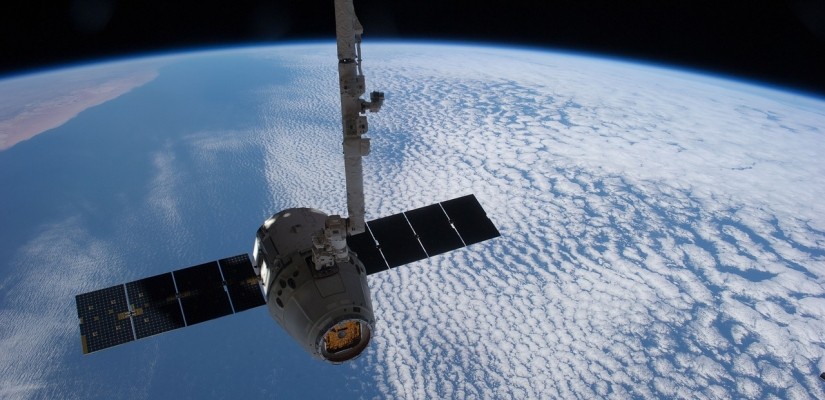Since the Soviet Union launched the first space satellite Sputnik I in 1957, the space industry has been dominated by state actors usually within the context of geopolitical competition such as the Cold War or through scientific cooperation, especially since the 1990s. More recently, however, technological innovation in space exploration has largely been driven by government investment due to the traditionally high cost and high levels of risk involved with funding and operating satellites, rockets, and other aerospace technologies. National security concerns and defense-related interests intertwined with the space industry have also historically acted as a barrier for private companies to enter the market other than through government contracts. At the same time, the commercial industry has received huge benefits from innovation that was originally devised for military satellites such as GPS technology. With the space industry acting as an intersection of innovation between the military and the commercial sector, it seems only natural that as time went on, high-end technology would become cheaper and more accessible, and that private industry would gradually play a larger role in the development of space technology. This is especially true for China, one of the more recent actors to enter the private space industry with growing startups like LandSpace, OneSpace, and iSpace.
However, in order to assess China’s effect on the space industry, it is important to get a context for how the private space industry has grown over the past decade. From 2009 to 2010, the number of new space industry startups more than doubled. Of the $323 billion spent on space activity in 2015, almost 40% of space products came from the commercial sector. Furthermore, satellites launched into space grew from 994 in 2012, to almost 1,500 in 2017, and revenue generated from the industry reached almost $128 billion that same year. According to Bryce Space and Technology, funding for space startups reached a record high in 2018 with $3.23 billion - more than 60% - coming from venture capital. In terms of overall industry growth, Goldman Sachs estimates that the space industry will likely increase to around $1 trillion in the 2040s. In general, private space startups can develop fast rockets that are much more cost-efficient while also generating innovation through increased competition that was previously unheard of in the space industry. Even NASA has cooperated with startups like SpaceX to develop new products.

Given so much increased investment, the Chinese government has also called on its own private industry to develop a bigger presence. Coordination between the state and private industry is a distinctive feature of China’s political economy and carries over to the space industry. With so much military and strategic interest involved in possessing a space presence, the integration between commercial and military interests is natural from the Chinese perspective. For example, the startups iSpace and OneSpace have both launched rockets from the Jiuquan Satellite Launch Center, which is run by the Chinese military. In 2012, President Xi Jinping declared that China ought to become a “spaceflight superpower.” Then in 2014, the Chinese government officially allowed private companies to launch their own satellites. President Xi has also repeatedly called for further integration between the military and civilian spheres, with the space industry acting as a frontier for this strategy. OneSpace was the first private space company to launch a rocket into orbit in May 2018. While the rocket was launched at less than a third of the international average cost, OneSpace has also received funding from businesses with ties to the Chinese military. With the Chinese spacecraft Chang’e 4 landing on the far side of the moon in January 2019, there are concerns of a new space race between the United States and China. In China’s 2016 white paper that discussed space policy, the government mentions how its space program’s long-term trajectory is focused on economic development through potential lunar or asteroid resource mining.
(Click here to read more about asteroid resource mining)
Despite this, Chinese space startups still predominantly rely on raising their own capital which has created many investment opportunities. In 2018, OneSpace was able to raise $44 million through China International Capital Corporation (CICC) Jiatai Equity Funds in one round of funding, and LandSpace raised $35 million in another according to Forbes. Even though Chinese companies held 3% of the commercial space industry, American companies are still leading, though it is unclear how long this trend will last. While 80% of all investments in the space startup industry were made by U.S. companies in 2018, almost half the companies receiving funds within the past three years have been based outside of the United States. In fact, the two startups that obtained the most funding between 2017 and 2018 were iSpace and Astroscale, based in China and Singapore respectively. Interest in China’s private space industry has clearly grown rather quickly with almost the entirety of funding being raised within the past three years.
Large companies such as Tencent have also shown interest in the industry, investing in the American startup Moon Express, which has also raised certain security concerns. Cybersecurity issues with under-protected private satellites, physical debris in outer space that can damage satellites, and a lack of proper regulation such as the outdated Outer Space Treaty are all issues that still affect the future trajectory of the private space industry. On a larger scale, whether there is a new space race and how militarized outer space becomes are overarching issues that will affect all actors in the space sector.

